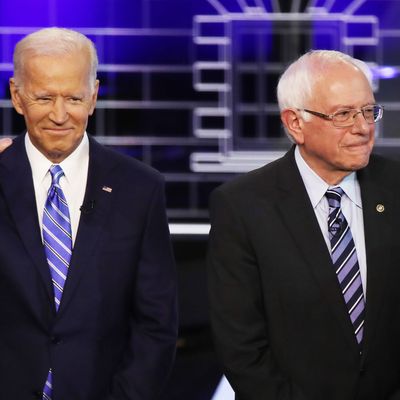
Among the many fraught concerns absorbing Democrats right now, from fighting for public health to designing an effective coronavirus stimulus effort to maintaining the right to vote, one that may be overestimated in its significance is the reconciliation of Bernie Sanders and his supporter to a Democratic ticket headed up by Joe Biden. Yes, of course, Biden has to be a gracious winner, and needs to call regularly for party unity, and can’t afford to say or do anything to alienate the one-time front-runner and the self-conscious progressive movement he has now led through two presidential cycles.
But as someone who once urged both of these men to stay out of the 2020 race because of their advanced age, I will acknowledge a silver lining to the reality that the finalists in the nomination contest were 77 (Biden) and 78 (Sanders) years old: their future ambitions should not be a bar to their cooperation in the defenestration of Donald Trump. That was not the case with the finalists four years ago: Hillary Clinton most definitely intended to be a two-term president if she won, and Bernie Sanders most definitely intended to run again if she lost.
For once, Terry McAuliffe is spot-on in a comment he made to Mark Leibovich in the wake of Sanders’s withdrawl from the race:
“There is a completely different dynamic now than in 2016,” said Terry McAuliffe, the former governor of Virginia and onetime Democratic National Committee chairman who has endorsed Mr. Biden. Four years ago, Mr. McAuliffe said, he believed that Mr. Sanders knew he would run again if he did not get the nomination, so it was in his interest to keep his supporters engaged and aligned with him. “This time, running again is not in play for either Bernie or Biden, so everyone has incentive to work together,” he said.
There is also this little matter of Trump being far less of an underdog going into the general election than he appeared to be four years ago, making the price of poorly consummated unity much higher. Beyond that, Biden’s implicit message of ridding the country of Trump and then offering a transition to a future others will define is now recognizable as a better outcome for progressives than the victory of a younger Democrat who might have put her or his stamp on the party for the foreseeable future. Indeed, one unity consideration Biden probably should take seriously is to avoid choosing a running-mate who could be perceived as prejudging the party’s future course in a direction hostile to progressives. Whatever its alleged appeal to swing voters, a Biden-Klobuchar ticket might invite a whole world of avoidable intraparty trouble.
If managed sensitively, the reconciliation of these two political warhorses should be far easier than the touchy Clinton-Sanders convergence of 2016, and pave the way to a smoother and more complete merger of supporters, recognizing there are some Sanders supporters who were honest in their Bernie or Bust bluster. Unless a President Biden takes the unlikely step of running for a second term as an octogenarian, 2024 will be a new day for Democrats, and a fresh start for those who would push the donkey to the left or to the center. That should make a 2020 truce the least of the party’s problems.






























